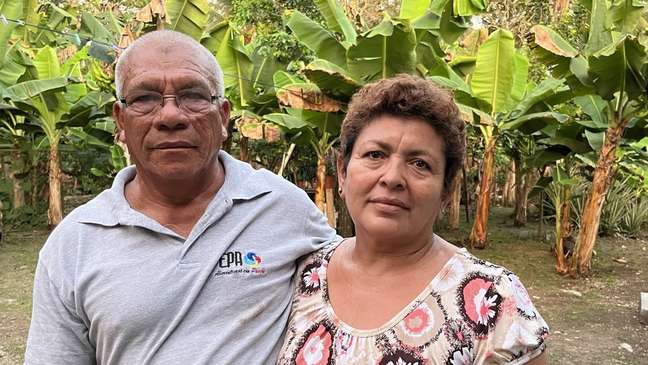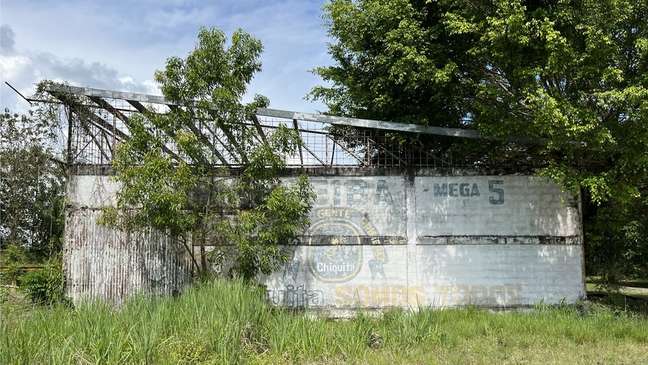American companies are accused of using a pesticide in Latin America, despite its known health risks.

Tens of thousands of former banana plantation workers say they were made sterile by a pesticide used by American companies on plantations in Latin America in the 1970s.
The United States restricted and subsequently banned its use on American soil due to the health risks, but workers in Central and South America continued to be exposed to it.
Journalist Grace Livingstone chronicles the decades-long battle of workers for justice from Panama.
Isabel Coba Mojica was 16 when she found work on a banana plantation in Chiriquí province, Panama.
When he started working on the plantation in 1967, it was run by a subsidiary of the American giant United Fruit Company, which has since changed its name to Chiquita Brands International.
Coba was hoping to start a family with his girlfriend, but she didn’t get pregnant. The couple eventually broke up and he met another woman, but his new partner also failed to conceive.
In the third year of 25 years on the plantation, Coba decided to seek medical help. The doctor tested his him sperm and said he couldn’t have children.
“I couldn’t believe it. I went crazy, I thought it wasn’t worth living anymore. It was a feeling of sadness and loss,” he recalls.
Coba was not the only worker on the banana plantations with health problems.
Rafael Martínez González worked on two different banana plantations managed by United Fruit in Panama.
Three years after starting work, Martínez’s wife had a miscarriage when she was six months pregnant. The couple never conceived another child.
No gloves, no boots
Across Panama, there are more than 1,100 former banana plantation workers who claim that a pesticide used by United Fruit on the plantations has made them sterile.
The pesticide, called dibromochloropropane or DBCP, targets microscopic worms that damage banana plants. But it can also affect male fertility.
Martínez believes that not enough precautions were taken when the pesticide, which had several trade names, including Fumazone, was sprayed.

“I sprayed a lot of chemicals. Usually when I sprayed Fumazone, I was given a mask, but no gloves, boots or other protective clothing,” he says.
American lawyers helped Martínez and Coba, along with hundreds of other Panamanians, to file a lawsuit against Chiquita and the pesticide manufacturers, but the two men say they never knew what the lawsuit was for and never received any compensation.
The problem isn’t even limited to Panama.
In Costa Rica, Ecuador, Guatemala, Honduras and Nicaragua, tens of thousands of former banana plantation workers have sued the companies that produced DBCP and the fruit companies that used it.
The companies in question are Dole Fruit, Del Monte and Chiquita and manufacturers Shell, Dow Chemical, Occidental Chemical and AMVAC.
Animal tests show testicular atrophy
The lawsuits claim that there was evidence that DBCP caused infertility in animals as early as the 1950s.
Scientists working for two of the manufacturers, Dow and Shell, conducted exposure studies in rabbits, rats and mice, which showed reduced sperm counts and in some cases testicular atrophy.
Charles Hine, one of the scientists who performed the tests, wrote in a preliminary 1961 report to U.S. regulatory bodies that repeated exposure to DBCP could affect human reproduction.
But according to correspondence from the company that the BBC had access to, the Shell official in charge of registering the chemicals with the authorities replied: “Leave out speculation about possible conditions that are harmful to humans. This is not a treaty on humans. safe use “.
When the pesticide was authorized in 1964, the label made no reference to potential impacts on male fertility.
Hine, who became a consultant to Dow and Shell, had also recommended waterproof protective clothing, but the pesticide label didn’t even mention the need for protective gear.
Factory workers have become sterile
Standard Fruit (now known as Dole Fruit) began using DBCP in banana plantations in Latin America in the 1960s, while Chiquita and Del Monte began in the early 1970s.
According to a lawsuit filed in US courts, Dole and Chiquita continued to use DBCP in Central America after 1977, although US regulators restricted its use in the US due to health risks.
That year, 35 workers at a DBCP plant in California were found sterile.
In 1977, the US Environmental Protection Agency (EPA) then suspended the use of DBCP on 19 plantations in the United States and imposed a “probation” on all other plantations in the country, which meant the product could be used. only in very restricted ways: only certified applicators could handle it and would be required to wear respirators and other protective clothing.
In 1979, the Environmental Protection Agency finally deregistered the all-purpose DBCP in the United States, exempting pineapple growers in Hawaii until 1985.
Although Shell and Dow discontinued DBCP production in 1977, they continued to legally export their unused pesticide stocks to several Central American countries, but not to Panama after that date.
Approached by the BBC, Dow said he “discontinued DBCP production on 11 August 1977, three weeks after learning that DBCP is capable of causing effects on male fertility in humans when found at very high doses in factories.” .
The statement adds that “Dow’s production of DBCP and all sales or shipments of DBCP occurred well before October 1979,” when the US registration of the pesticide was canceled.
Shell’s DBCP pesticide trade name was Nemagon. A company spokesperson said, “Shell voluntarily suspended production of Nemagon in 1977 after the US Environmental Protection Agency raised concerns about the effects of DBCP and had already ceased all sales or production of Nemagon before. that the EPA banned its use in the United States in 1979 “.
According to the lawsuit, Occidental Chemical continued to sell DBCP in Panama until 1979 and AMVAC continued to supply DBCP to Panamanian distributors until 1985.
Occidental Chemical declined to comment. But AMVAC’s chief executive told the BBC that “the sales and uses you focus on are more than 40 years old.”
He wrote: “According to the documents I have seen, the company allegedly sold DBCP in bulk to distributors who, in turn, were selling the goods in various Latin American countries. The final destination of these goods was often unclear.”
“Why the company sold DBCP during the time period in question, after the US cancellation, I don’t know. This would have been known to decision makers in the 1970s.”
Dow added that “the science of DBCP is clear” and that “the dose is the determining factor”.
“Low-dose, outdoor or intermittent exposures will not affect male fertility,” he said.
Their statement states that DBCP has been shown to “affect the reproductive function of some male workers who have handled it directly at very high doses in factories.”
But he argues that “agricultural workers would have potentially used significantly lower doses and no studies of agricultural workers showed a similar effect when working with DBCP.”
Dole states on its website that “there is no credible scientific evidence that Dole’s use of DBCP on banana farms caused any of the claimed harm in any of the DBCP-related lawsuits, including infertility.”
The company also said it stopped purchasing DBCP in 1979 when the U.S. Environmental Protection Agency deregistered it for use in the country.
Chiquita and Del Monte did not respond to requests from the BBC.
Ten-year legal battle
After nearly three decades, there has only been one case in which a US court has assessed whether the pesticide caused sterility.

Six banana plantation workers in Nicaragua were found to have been rendered sterile under the DBCP, but this historic ruling was overturned on appeal when the companies successfully claimed the case had been tainted by corruption.
To date, there have been no successful litigation in the United States promoted by banana plantation workers.
Their lawsuits were filed for procedural reasons or the companies settled the case out of court, making payments to some plaintiffs but not taking responsibility.
There are currently only two active lawsuits in the United States. Scott Hendler, the attorney who is suing on behalf of workers in Guatemala, Costa Rica, Ecuador and Panama, says the companies “were running into procedural problems all the time.”
He wants a jury to see the evidence.
“There is no question that DBCP can cause infertility,” he says.
“The question is whether each of the plaintiffs suffered sufficient exposure on their own to be a substantial factor in causing their own infertility.”
Martínez, Panama, is one of thousands of banana plantation workers whose case was dismissed without evidence being heard.
BBC investigations show that his lawsuit, along with the actions of more than 1,160 Panamanians, was dismissed by a California judge in 2010 on grounds of not convenient forum – a legal doctrine which means that this particular court was not the best place to look into the case.
The court has never heard of Martínez’s infertility or that he managed the DBCP without gloves.
Coba’s name doesn’t appear in any of the pending lawsuits, so it’s likely that her case has also been dismissed.
Coba sometimes imagines what her life could have been like:
“My brothers who have not worked on the banana plantations have children. I see my grandchildren running and sometimes I feel a sense of loss. It’s sad, it’s painful.”
– This text was published in https://www.bbc.com/portuguese/geral-62250189
Source: Terra
Benjamin Smith is a fashion journalist and author at Gossipify, known for his coverage of the latest fashion trends and industry insights. He writes about clothing, shoes, accessories, and runway shows, providing in-depth analysis and unique perspectives. He’s respected for his ability to spot emerging designers and trends, and for providing practical fashion advice to readers.


-sl6oy2p06omu.png)



![Such a great sun in advance: Elizabeth’s Terrible Accidental Victims … which Waiting for You Week until August 25, 2025 [SPOILERS] Such a great sun in advance: Elizabeth’s Terrible Accidental Victims … which Waiting for You Week until August 25, 2025 [SPOILERS]](https://fr.web.img6.acsta.net/img/d0/c4/d0c4d9256b5997c98008a65d7a43177e.jpg)
